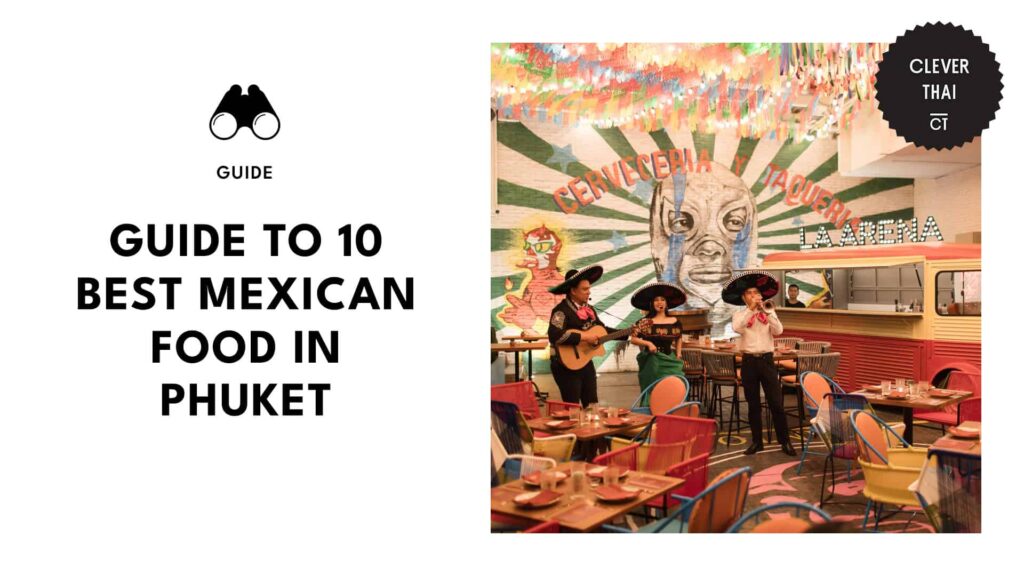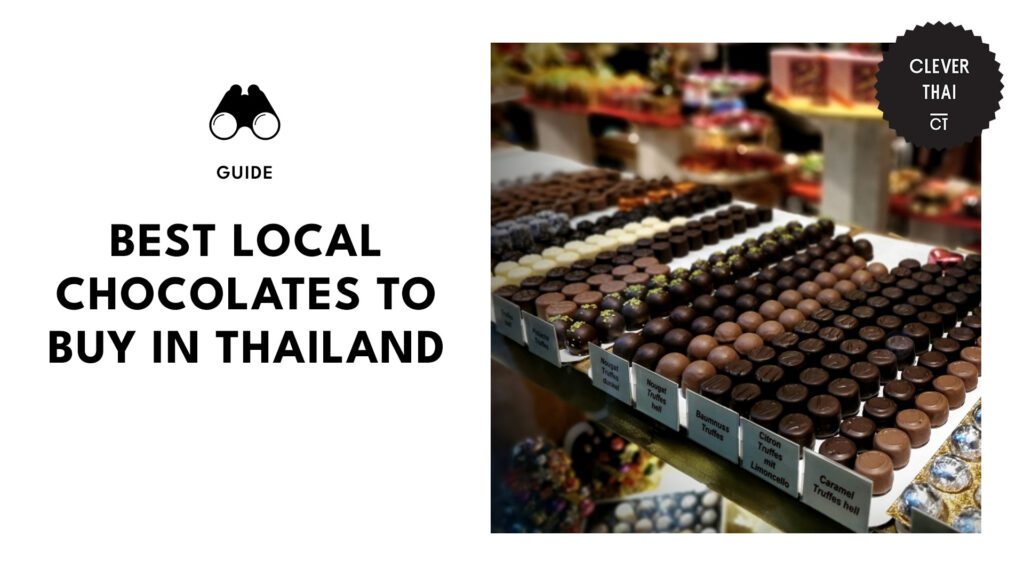Categories > Guides and Tips
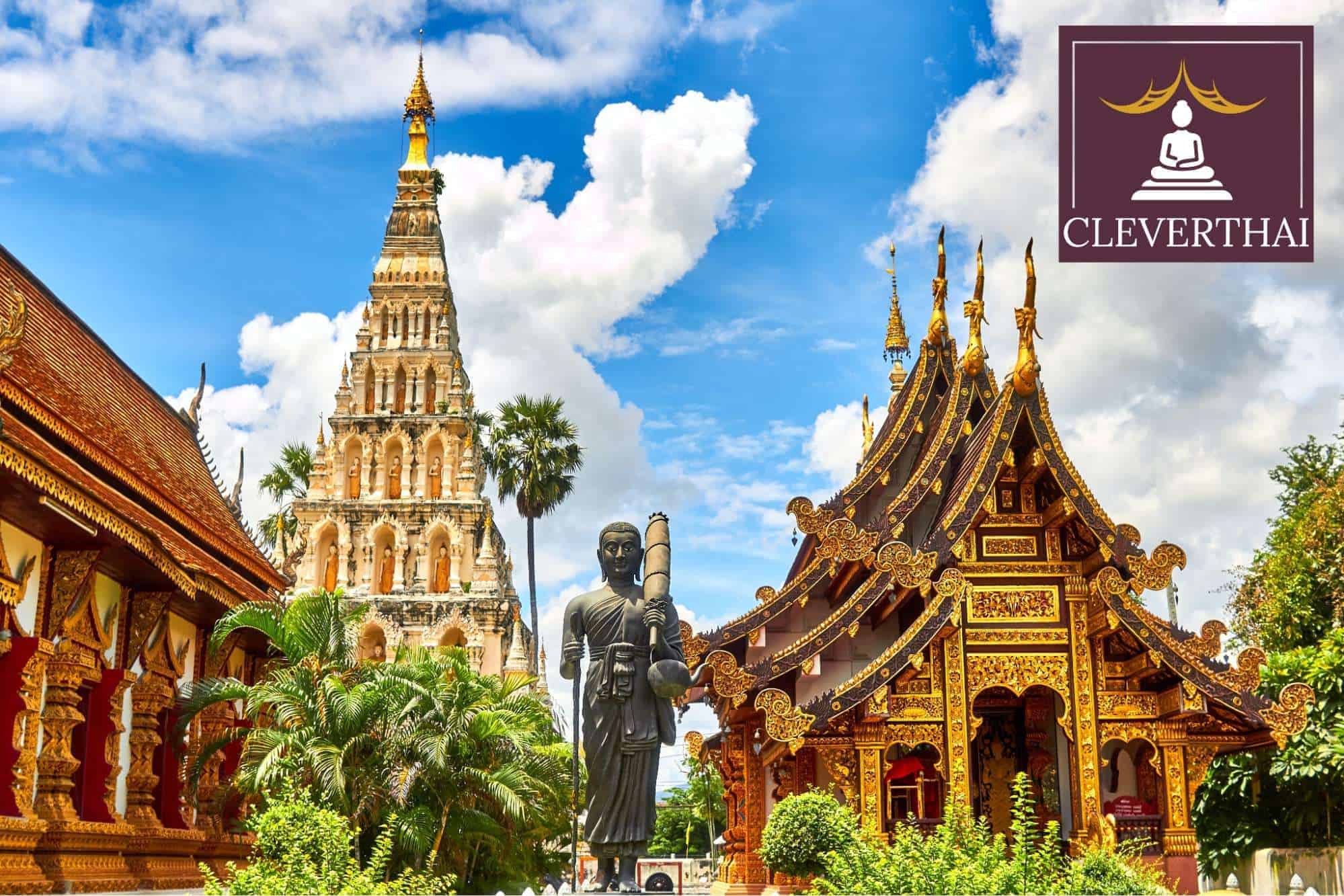
10 Mistakes to Avoid on Your First Trip to Thailand
- Falling victim to the Bangkok tuk-tuk scam.
- Other transportation scams you should know of
- Packing too much or too inappropriate clothing.
- Bringing too many clothes
- Wearing inappropriate clothing
- Staying in the wrong area.
- Breaking the rules.
- Don’t forget to do the wai.
- Be careful where you put your hands.
- Avoid public displays of affection.
- Ask before you snap.
- No shoes inside, please.
- Insulting the Thai Royal Family.
- Exchanging your money to Thai Baht BEFORE the trip.
- Bargaining too much or not at all.
- Forgetting to wear sunscreen.
- Not knowing common Thai phrases.
- Not purchasing a Thai SIM card.
- FAQs about Travelling to Thailand
Travelling to Thailand may be your dream come true, or just one box ticked on your bucket list. However, no one can deny that visiting the Land of Smiles is a pleasure.
The ten mistakes to avoid on your first trip to Thailand for a stress-free journey include stuff as simple as packing too much clothing, forgetting sunscreen, or not knowing common Thai phrases. Serious mistakes include disrespecting the Royal Family, breaking cultural rules, and falling for scams.
Let’s look at the do’s and don’ts of Thai travel, shall we?
1. Falling victim to the Bangkok tuk-tuk scam.
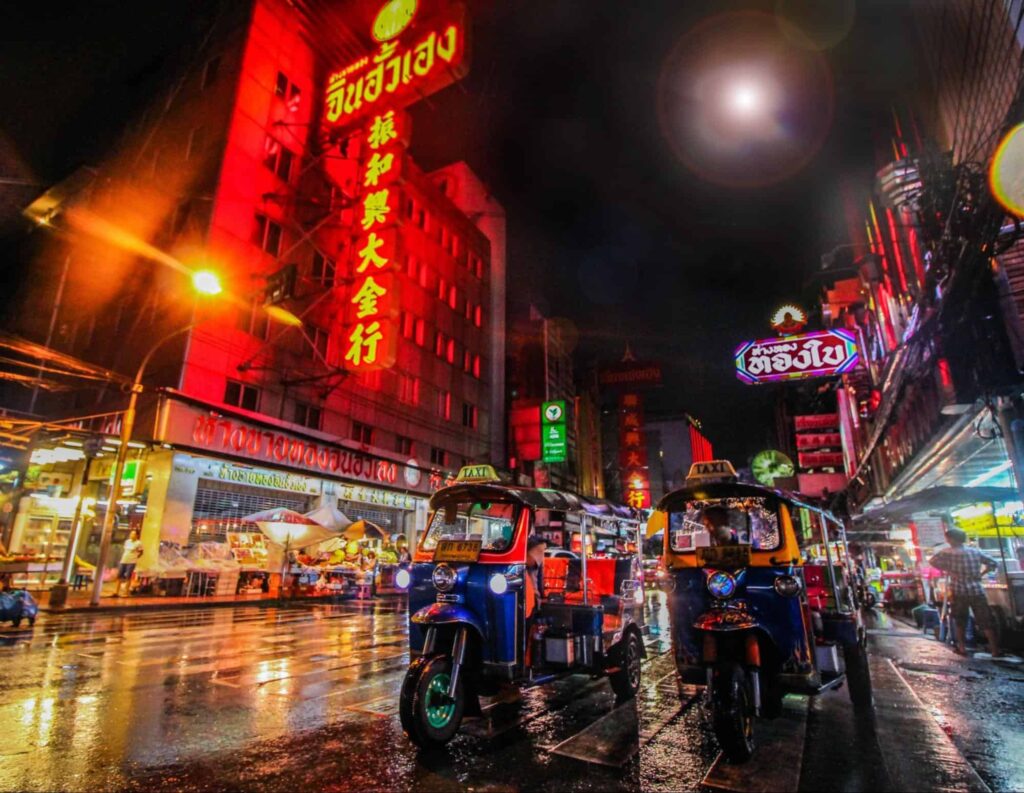
You are fortunate if you manage to get into a Thailand tour with transportation already provided throughout. However, not all tourists are rich enough to afford this, let alone limo service; so most will rely on public transport.
First-time visitors are the easiest targets for these scammers because they’re inexperienced. They can easily give in to modus operandi masquerading as polite “requests,” “instructions,” or “efficient pro tips.”
It includes falling victim to the infamous Bangkok tuk-tuk (auto rickshaw) scam.
Tuk-tuk scams can go one of two ways: Firstly, tourists can be overcharged for rides in tuk-tuks, even if the whole route travelled is actually short.
On the other hand, tourists can also be taken on winding routes or to shops where they are pressured to make expensive purchases. In this case, the tuk-tuk scam becomes a part of bigger, more elaborate schemes, like gem (jewellery) or tailor scams.
The scamming tuk-tuks can get a cut on the purchases you make or be paid gas money by the accomplice stores, which makes the whole ordeal very lucrative and hard to stop.
You might be targeted by scammer tuk-tuks anywhere: famous tourist spots, in front of your hotel, or any roadside area. They prey on uninformed foreign tourists or people who look visibly tired of their travels.
Other transportation scams you should know of
Another transport scam you should be aware of that’s primarily found in cities and in front of hotels are taxi scams. These involve taxis using tampered meters or drivers overcharging tourists for rides.
Then there are bus scams. Tourists may get overcharged for bus tickets by people pretending to be from the transport authority or lose their belongings stored in and under the bus due to being stolen during stops.
Worse, tourists can be approached by shady individuals on the bus. They would drug these unsuspecting victims and steal their belongings.
Last are the boat scams. Like the previous ones, it can also involve tourists being overcharged or diverted to a longer, and thus more expensive, boat route.
To avoid transport-related scams in Thailand, be cautious and alert at all times.
Do your research before making travel arrangements. If you can find tour packages that already have transportation included, like bus tours, that’s better.
Familiarize yourself with local laws, travel policies, and customs like holidays to get the upper hand in case you become the target of a scammer.
Don’t forget to transact only with legitimate transport companies (here’s our suggested list of great taxi companies) and government authorities. A good rule of thumb is that YOU should always be the first to approach them, not the other way around.
2. Packing too much or too inappropriate clothing.
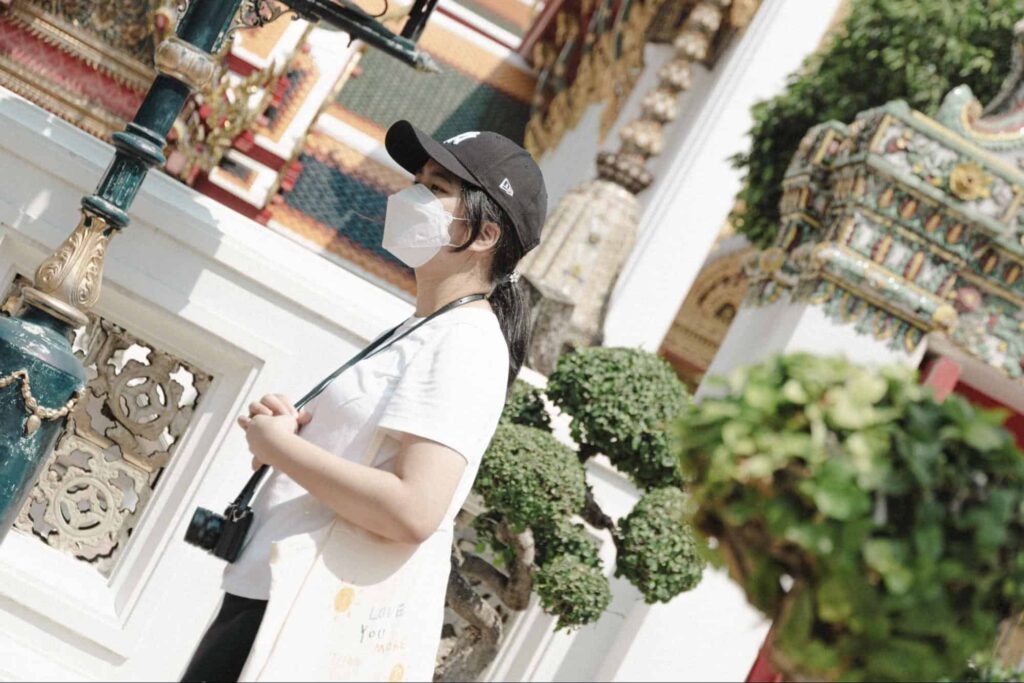
One of the biggest mistakes of travellers is packing too much or too inappropriate clothes for a trip. We’ll discuss each mistake further below:
Bringing too many clothes
All of us are too familiar with the cliche of packing stuff “in case” something happens—the packer ends up having too many suitcases filled up.
Packing too much clothing for a trip to Thailand is undesirable because it’s inconvenient and costly. It’s not guaranteed that you’ll be able to use 100% of the clothing you bring to your trip.
Having too much luggage is a hassle, especially if you travel alone and use public transportation. The heaviness of baggage and the risks of losing bags along the way can be unnecessary causes of stress on your trip.
Moreover, if you’re travelling by plane, it will be inconvenient if your luggage exceeds the allowable baggage weight limit. You’ll have to find creative ways to bring all your stuff aboard the plane, or worse, let go of some of your precious clothes.
Having heavy and numerous bags is costly, too. Some forms of transport, like buses or planes, can charge for overweight or oversized luggage.
Wearing inappropriate clothing
On the other hand, like packing too much clothing, it’s also easy to fill your luggage with swimsuits and skimpy clothing. This is given Thailand’s classification as a tropical country.
However, this choice of vacation wardrobe may backfire in the middle of your trip if your itinerary consists of Buddhist temples.
These temples require visitors to wear modest clothing as a form of religious respect.
For example, men must wear pants (shorts are allowed too) and sleeved tops. On the other hand, women must wear tops that cover the shoulders and bottoms that hide the knees instead of sleeveless tank tops and shorts.
Clothing so thin it’s almost see-through isn’t also allowed. Check out our post on what to wear in Thailand to know what fabrics are best for the Thai heat.
The repercussions of making this mistake aren’t as simple as just getting judging looks from fellow visitors. It could ruin your trip because you won’t even be allowed to enter the temple premises if you’re not wearing proper attire.
Thus, the best thing to do is pack conservative outfits, especially if you’re visiting Thai temples. If not, you might need to buy new clothes in local boutiques once you touch down in Bangkok, which will cost you more.
3. Staying in the wrong area.
The primary rule for safety in travel (anywhere) is to NOT visit or stay in dangerous places.
Like any other country, Thailand has hazardous areas to travel to because of high crime rates, political and cultural turmoil, and other safety issues. Every visitor should be aware of this critical information by reading the news and other travel advisories.
Crime rates are considerably higher in tourist areas and cities like Bangkok, Pattaya, Chiang Mai, Phuket, and Koh Samui. Petty crimes like pickpocketing and other forms of theft are common, especially in areas frequently crowded with tourists.
However, that doesn’t mean that you should avoid these cities altogether. You just need to stay away from areas known for illegal drugs, illicit sex trade, and elaborate scams.
Some places to avoid include Bangkok’s Khao San Road, Soi Cowboy, Nana Plaza, Patpong, and the slum areas of Khlong Toei district, to name a few.
Stick to hotels or motels, nightlife (clubs, pubs, etc.), and restaurants in safer areas like Ekkamai or Sukhumvit.
Aside from not staying in unsafe areas, we suggest planning your accommodation based on its proximity to the places you want to visit.
Staying the night near tourist attractions you’ll go to the next day is the best way to save yourself precious time, energy, and money.
You don’t want to spend most of your day on the road instead of the attractions just because you booked a hotel too far from that beach or temple you want to see!
4. Breaking the rules.
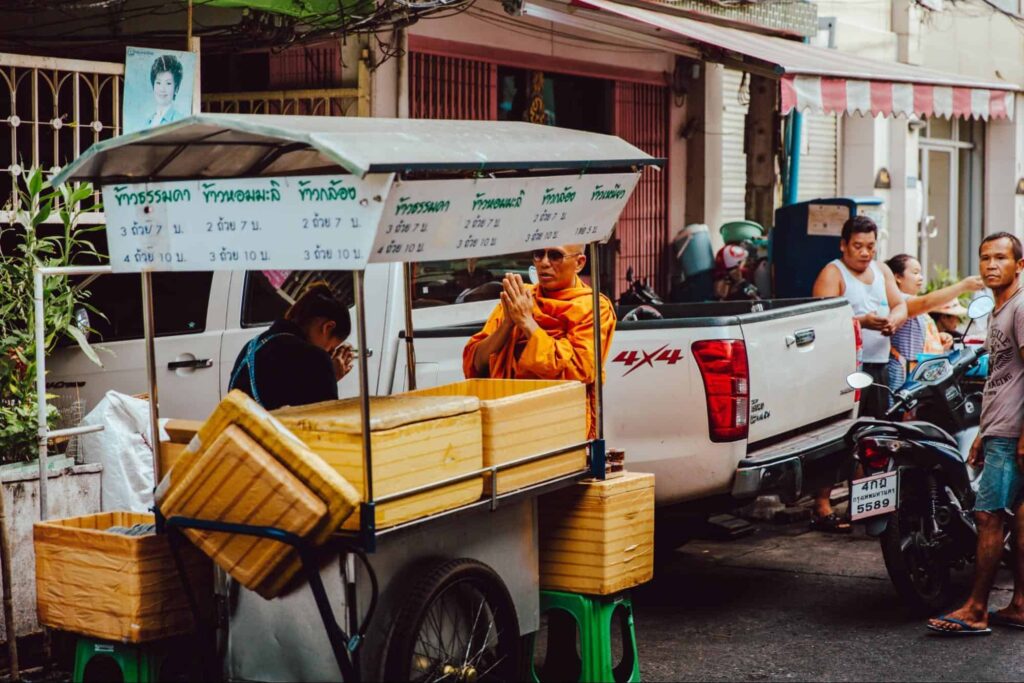
It’s a given not to break the law by committing a crime, especially in a foreign land. However, playing on the safe side is also the best thing to do for simpler stuff like customs and traditions.
Remember the golden rule, “do unto others as you would have them do unto you.” It’s the most helpful thing you should remember for life, and it generally applies everywhere, too.
Here are unique rules for Thai etiquette that you should know. Having enough knowledge can help you from accidentally breaking these customs or showing disrespect to the locals.
Don’t forget to do the wai.
A wai is the Thai equivalent of a handshake or wave. It can also be used in saying thanks or apologising.
It’s done by putting your hands together as if in prayer, and then bowing down a little toward the person you are referring to.
They say the gesture has Buddhist roots in symbolising balance and equality.
This gesture goes hand in hand with saying the greeting “sawadika” (“hello”) for females or “sawadikhrap” for males. If you’re the receiver of a wai, you should do a wai back while saying “sawasdee.”
You won’t need to greet people with a wai when talking to someone younger than you.
Be careful where you put your hands.
Aside from the wai, you should know and follow other crucial Thai etiquette rules involving hands or touch.
Firstly, do not touch people’s heads because these are considered sacred; this is the same for any statue of Buddha. If you accidentally touch someone’s head, immediately ask for forgiveness, and all will be well.
Similarly, pointing fingers at objects or people is considered disrespectful in Thailand. If the need to point to something is inevitable, it’s best to use the whole palm or hand to lead attention to something.
You should also never touch a monk, especially if you’re a female. Unfortunately, the female form is considered threatening a monk’s virtues, which is why Buddhist monks in Thailand (and only here) do not directly interact with women.
Just do a wai (but don’t expect them to give a wai back) and give them the highest form of respect you can.
Avoid public displays of affection.
Thailand, like other Asian countries, is generally conservative regarding displaying affectionate actions. Thus, keeping the PDA at a minimum is best if you’re travelling with your significant other.
Ask before you snap.
Photography is generally allowed in public places like temples, but make sure to also consider the privacy of other people or establishments around you.
Ask for permission or rules about taking pictures before snapping that photo.
No shoes inside, please.
Lastly, when going inside a Thai home, wat (temple), palace, or even mom-and-pop stores, make sure to remove your footwear and leave them at the door. Like in Japan, shoes are considered dirty in Thai culture and are not allowed inside dwellings.
In addition, never step on any door threshold—just go over it unless you want to antagonise the spirits around a Thai building or home.
You can go and take pride in your beautiful shoes outside instead, especially if you’ve bought a great pair from one of the best shoe stores in Bangkok.
5. Insulting the Thai Royal Family.
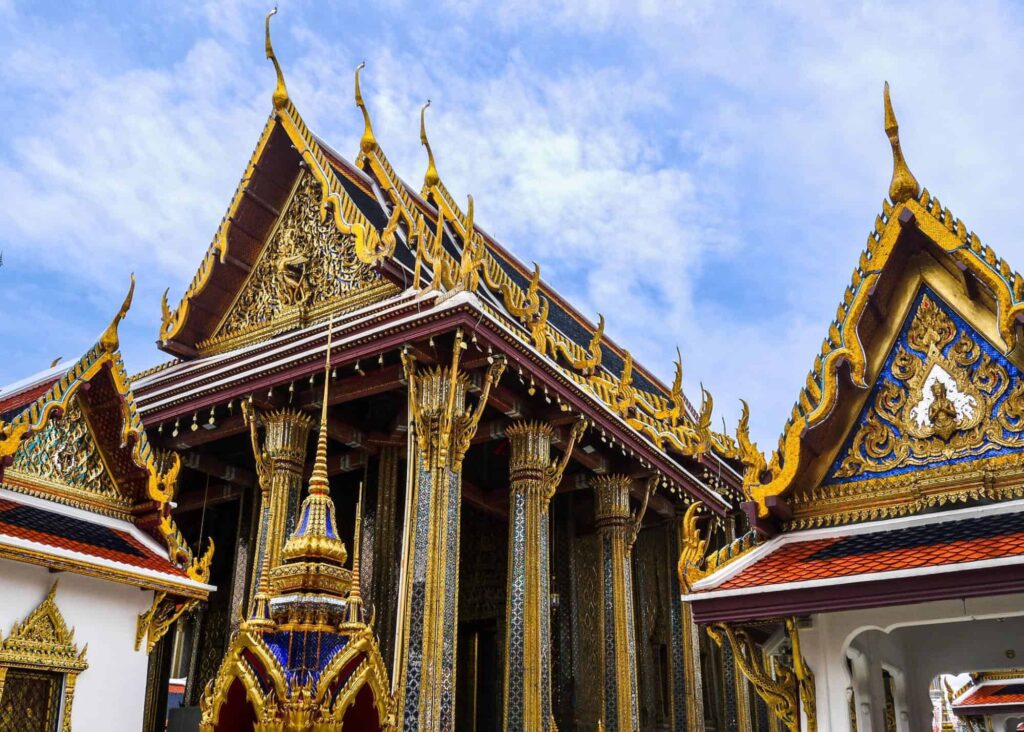
Thailand is a constitutional monarchy, but it has a democratic government. It means that the head of state is the King, but the head of government elected by the National Assembly is the Prime Minister.
Thus, it goes without question that the Thai Royal Family is highly respected and revered in Thailand because they symbolise unity and national identity.
Insulting the Royal Family is considered a severe offence under laws prohibiting disrespect of the monarchy, known as lèse-majesté. Thailand’s lèse-majesté has been in place since 1908 (2451 B.E.) and is sometimes considered the “world’s harshest.”
Section 112 of the Thai Criminal Code states that insulting, threatening, or defaming “the King, the Queen, the Heir-apparent or the Regent” is illegal. Any offender can be punished by “imprisonment of three to fifteen years” for each count of offence.
Anyone can report someone for this crime, and Thai courts can deny posting bail, even if you manage to get a good lawyer. Therefore, it is best to avoid actions or words that could be seen as disrespectful or insulting toward the Thai Royal Family.
These include spoken or written insults (even online) and gestures or actions that could be interpreted as disrespectful. Destroying or stepping on the pictures of the Royal Family or not standing when the Thai National Anthem is played are examples to avoid.
We’ve further discussed what happens when you insult the government or the King of Thailand, here.
Insulting the Thai Royal Family is the biggest mistake any visitor can make in Thailand. It can drastically affect one’s life and freedom, so it’s very important to be mindful of customs and laws and respect the royal family and other cultural traditions.
6. Exchanging your money to Thai Baht BEFORE the trip.
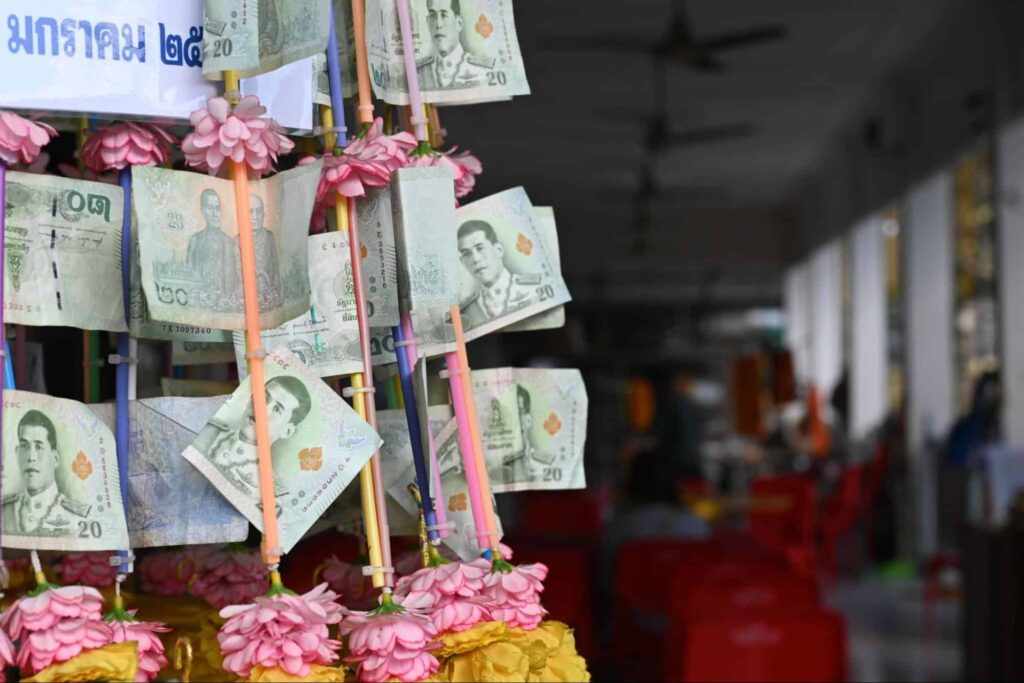
You might get the idea of exchanging your home currency for the Thailand Baht (THB) way before your trip. It may sound reasonable at first glance, but it’s not a good thing to do because of ever-changing exchange rates.
Any amount you exchange at home can cost more (great!) or less than it could be if exchanged during your actual trip to Thailand. You could lose hundreds of Baht if you exchange for a lower rate at home.
Pro tip: The best currency to take to Thailand is the US Dollar (USD). It can easily be exchanged into Thai Baht upon arrival—the best rates are usually in FOREX places in the cities, not at the airports.
Note that conversion of any foreign currency into THB is necessary because establishments in Thailand only accept THB for payments.
7. Bargaining too much or not at all.

Any vacation isn’t complete without shopping in bazaars and flea markets, especially in tourist hotspots like Bangkok, Phuket, or Pattaya. Just be ready for the struggle between the enterprising shop owners’ high pricing for tourists and your wallet.
We can’t blame shopkeepers for charging tourists high prices, though. The intense competition between stores and the uncertainty in the frequency of making a sale really affects the livelihood of the locals.
Thus, it’s highly encouraged to haggle or bargain with local shopkeepers. Tourists who don’t do so usually get less than what they paid for, meaning the items they purchase could cost double or even triple the actual price.
Don’t treat the first price of goods or services given by shopkeepers as final. The usual (and best) technique is to haggle starting at half the cost of the item until you and the shopkeeper reach a compromise amount.
One word of caution, though: be careful about going overboard or bargaining too much.
Trying to bargain for cheaper food or drink if you’re somewhere in the middle of nowhere where goods will cost more expensive is insensitive (and cruel). Consider the shop’s location and the overall lifestyle of the people there when naming your price.
In the end, bargaining is simply learning to communicate your budget restrictions and standing your ground to get the best and fairest pricing for the goods you buy.
Don’t be ashamed to do it, but note that this practice won’t apply to higher-end establishments and circumstances where high pricing is justified.
8. Forgetting to wear sunscreen.

Dermatologists advise us to wear sunscreen every time we go outside. Sunscreen protects our skin from harmful UV rays and lowers the risk of skin cancer.
Since the sun’s rays are more intense in tropical climates like Thailand, you’re at an increased risk of sunburn and other forms of skin damage if you don’t protect yourself with sunscreen.
Getting a sunburn is one of the most uncomfortable experiences one can have during a trip, so we highly advise you to prevent having it as much as possible.
If you forget to put sunscreen on, try to get out of the sun and apply some as soon as you can. Reapply it every 2-3 hours or more frequently if you’re sweating or swimming.
Skincare is something that shouldn’t be taking a vacation—even if you are.
9. Not knowing common Thai phrases.
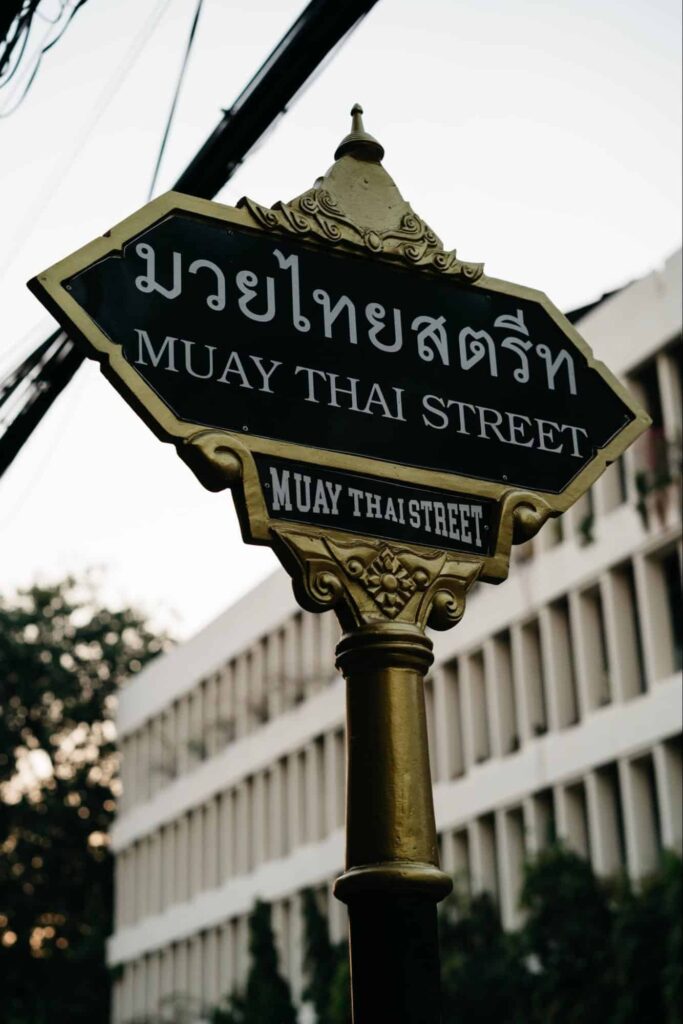
Knowing or speaking Thai is not required, especially for someone visiting Thailand for the first time. However, learning basic Thai greetings and expressions can actually help a lot in making your trip better.
Asking for directions, bargaining, and ordering food will be easier if you have even just a little grasp of Thai. Furthermore, learning the local language is the best way to understand a country’s people and culture.
Here’s a YouTube video from Mari Johnson showing the most common phrases you can use on your Thailand trip:
Thai is generally considered tricky to learn because it’s a tonal language. This means that different inflections (five, in this case) can change the meaning of the same word.
The language also uses its own script or writing system (abugida). So, if you’re dead set on fully reading and writing Thai, you’ll need to learn a whole new alphabet that’s very different from the Latin ones we’re used to.
Learning any language is not easy, but we’re 100% sure that knowing even a bit of Thai will be worth it.
10. Not purchasing a Thai SIM card.
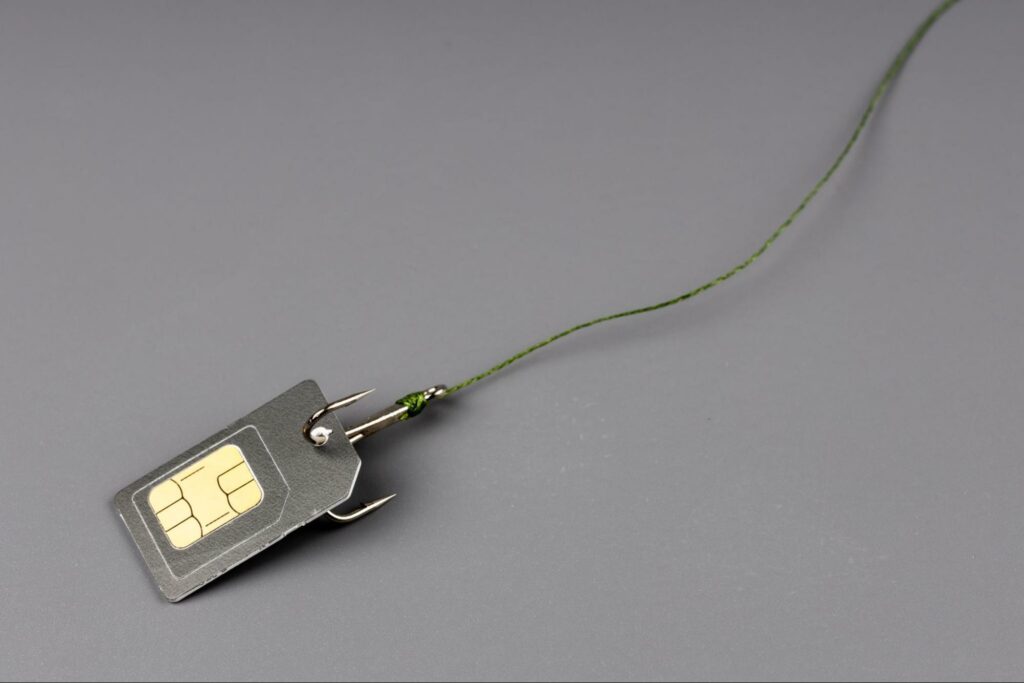
Having another phone number to memorise might not be a welcome thought. However, you might consider buying a local SIM card when you get to Thailand for several reasons.
First and foremost is for lesser costs.
Using a local (Thai) SIM card is much less expensive than roaming with your home network. Mobile data, call, and SMS charges are definitely cheaper for local-to-local numbers than international-to-local ones.
Having a Thai phone number can also be helpful when you need to give your contact information to locals. For example, in hotel or restaurant reservations, locals won’t hesitate to call you back in case of any changes because it won’t cost them a lot.
If your local number gets compromised in any way, it will also be easier for you to get a new one—this will be harder to do if you’re roaming with your foreign SIM.
Lastly, it’s easier to call Thai emergency numbers with a local SIM.
Pro tip: Here’s a list of numbers you can reach if you need help while in Thailand.
| Agency | Hotline |
| Thailand Government | 1111 |
| Police | 191 |
| Ambulance | 1669 |
| Fire | 199 |
| Tourism Authority of Thailand (TAT) | 1672 |
| Tourism Police | 1155 |


